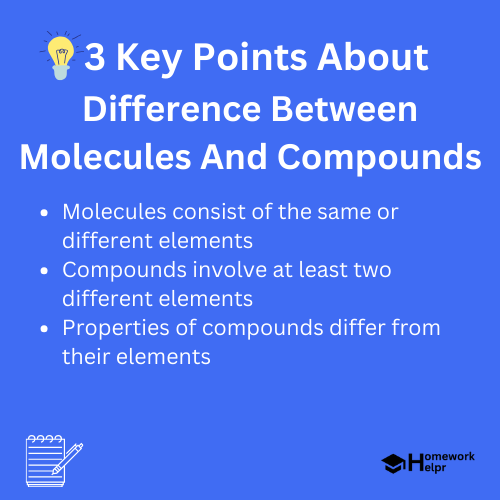📝 Summary
In chemistry, molecules and compounds are often confused but represent distinct concepts. A molecule is the smallest unit of a substance that retains its chemical identity and can consist of either the same or different elements. Compounds, however, are specific types of molecules made up of at least two different elements, exhibiting unique properties that differ from their individual components. For instance, water (H‚ÇÇO) is both a molecule and a compound, while oxygen (O‚ÇÇ) is solely a molecule. Understanding these differences is essential as they play crucial roles in medicine, environmental science, and materials development. Recognizing their properties enhances comprehension of various substances and their interactions in nature.
Understanding the Difference Between Molecules and Compounds
In the world of chemistry, two terms frequently come up: molecules and compounds. Though they are often used interchangeably, they are distinctly different concepts that have unique properties and meanings. This article will dive deep into the characteristics of molecules and compounds, how they relate to each other, and their importance in the study of chemistry.
What is a Molecule?
A molecule is formed when two or more atoms bond together. This bonding can take place between atoms of the same element or different elements. The key point here is that a molecule is the smallest particle of a substance that retains its chemical identity. This means that it contains all the properties of that substance.

For example, the hydrogen molecule (H‚ÇÇ) consists of two hydrogen atoms, while oxygen (O‚ÇÇ) is made of two oxygen atoms. Both of these are examples of molecules consisting of atoms of a single element. However, molecules can also form from different elements. For instance, water (H‚ÇÇO) is made up of two hydrogen atoms and one oxygen atom.
Definition
Molecule: The smallest unit of a chemical compound that retains its chemical properties and is made up of two or more atoms.
Example
Example 1: Oxygen gas (O‚ÇÇ) is a molecule that consists of two oxygen atoms.
Example 2: Carbon dioxide (CO‚ÇÇ) is a molecule that consists of one carbon atom and two oxygen atoms.
What is a Compound?
A compound, on the other hand, is a molecule that contains at least two different types of elements bonded together. In other words, all compounds are molecules, but not all molecules are compounds. Compounds have unique properties that are different from the properties of the individual elements that comprise them.
For instance, table salt (NaCl) is a compound formed from sodium (Na) and chlorine (Cl). Sodium is a highly reactive metal, while chlorine is a toxic gas, but when these elements combine, they form a stable compound. This illustrates a vital concept in chemistry: the properties of compounds can be completely different from those of the individual elements that form them.
Definition
Compound: A substance formed when two or more different elements are chemically bonded together, resulting in unique properties.
Example
Example 1: Water (H‚ÇÇO) is a compound, while both hydrogen (H) and oxygen (O) are elements.
Example 2: Ammonia (NH‚ÇÉ) is a compound made of nitrogen and hydrogen.
Key Differences Between Molecules and Compounds
To understand the differences more clearly, let‚’ break it down into several key points:
- Composition: Molecules can consist of the same or different elements while compounds must have at least two different elements.
- Properties: The properties of compounds are different from those of their constituent elements, while the properties of molecules may or may not differ if they are made of the same type of atoms.
- Examples: Water (H‚ÇÇO) is both a molecule and a compound, while oxygen (O‚ÇÇ) is only a molecule.
- Bonding: A molecule is typically the smallest recognizable unit, while a compound refers specifically to a combination of elements in a fixed ratio.
Similarities Between Molecules and Compounds
Although molecules and compounds have distinct definitions, they share some similarities as well:
- Both are formed by the bonding of atoms.
- Both can exist in solid, liquid, or gaseous states.
- Both are represented using chemical formulas that indicate the types and numbers of atoms present.
Real-World Importance of Molecules and Compounds
Molecules and compounds play a crucial role in our daily lives and the environment. Understanding their properties helps us in various fields, including:
- Medicine: Many medications are compounds that target specific molecules in the body.
- Environment: Compounds like carbon dioxide (CO‚ÇÇ) contribute to climate change, while understanding them can help develop solutions.
- Materials Science: Knowledge of how molecules interact assists in creating new materials with desired properties, such as plastics and metals.
💡Did You Know?
Did you know that the human body is made up of about 60% water, which means that it consists predominantly of a compound?
Conclusion
In summary, molecules and compounds are fundamental concepts in chemistry that you need to understand as you delve deeper into the subject. Molecules can consist of the same or different atoms, while compounds specifically refer to those made of two or more different elements. Recognizing the differences and similarities between them is essential for grasping the complexities of chemistry.
By knowing the characteristics of both molecules and compounds, students can better appreciate the intricate nature of substances and their interactions. Keep experimenting, exploring, and questioning; chemistry is all around us!
Related Questions on Difference Between Molecules And Compounds
What is a molecule?
Answer: A molecule is formed when two or more atoms bond together, retaining the chemical identity of the substance.
What is a compound?
Answer: A compound is a type of molecule composed of at least two different elements that possess distinct properties from those individual elements.
What differentiates a molecule from a compound?
Answer: A molecule can consist of the same or different elements, while a compound must contain at least two different elements.
Can a compound exist as a molecule?
Answer: Yes, all compounds are molecules, but not all molecules qualify as compounds.
